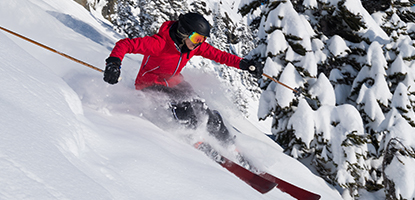
 December 19, 2019
December 19, 2019
Heading off to the slopes this winter?
Getting to grips with a set of skis can be hard enough, so choosing the right winter sports cover shouldn't have to be.
Here's what you need to know to protect yourself both on and off the slopes.
If you're heading off for an adventure on the slopes this ski season, be sure to check if your travel insurance includes winter sports cover or if you'll need to buy this as an add-on to your travel insurance policy.
Direct Line offers winter sports cover as an optional add-on, insuring you against:
- Winter sports injuries
- Piste closures
- Loss, damage and theft of winter sports equipment - be that your own or hired
Our winter sports cover also offers helpful extras, such as cover for unused, lost, or stolen ski passes and potential payment for travel to another resort should your planned destination be closed.
You should also check what medical insurance is included in the winters sports cover you're considering. Whether you consider yourself an attentive amateur or a polished professional, costly accidents on the slopes can happen. Based on Direct Line Group's claims data for 2018/2019, a piste rescue by helicopter could cost upwards of £2,000, and an air ambulance from the Alps to the UK will exceed £10,000.
We want everyone to enjoy themselves safely, and from experience we know accidents do happen. That's why it's so important to make sure you have the right cover for your needs.
Other Insurance tips:
- Skiers should check whether their policy covers off-piste skiing, and whether there are any conditions (such as the requirement to be accompanied by an instructor if going off-piste, as with Direct Line's policies).
- Some insurers will only pay medical claims if you're wearing a helmet (Direct Line doesn't currently enforce the wearing of ski helmets, but strongly recommends it).
- For trips within Europe, you should remember to take a valid EHIC with you, remembering that it doesn't cover all medical expenses or the cost of getting patients back to the UK. This is available completely free of charge. Visit the NHS website to order one: www.ehic.org.uk
Protection on-piste:
- Protect yourself against head injuries by wearing an EN 1077 approved ski helmet that fits well and is in good condition.
- Be alcohol aware and know your limits.
- Check that your ski bindings are set according to your weight and skiing style/speed.
- Make sure your speed and chosen terrain match your ability.
- Be aware of your surroundings and other skiers, and observe the etiquette of the slopes you're skiing on.
- Stay warm and hydrated.
- Wear an appropriate strength sun cream on your face.
- Wear goggles or glasses that offer 100% UV eye protection.
- Carry a piste map with you in case you get lost.
- Keep a mobile phone or radio with you for mountain communications and make a note of the emergency numbers for the resort.
- Always ski with other people. Where this isn't possible, advise someone of your whereabouts.
